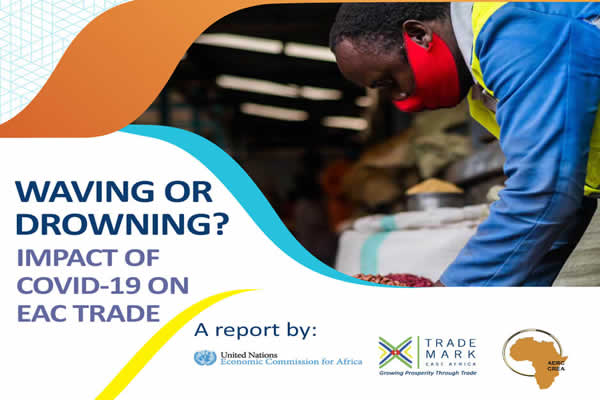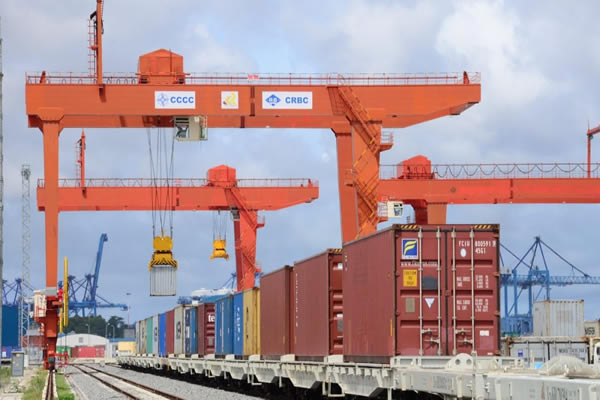- Exports held up well and the regional trade balance improving due to lower imports, according to the report by (United Nations Economic Commission for Africa) UNECA.
- The UNECA report indicates that the transport and logistics sector took a hit at the beginning of the crisis, with high levels of congestion at borders and ports. Immediately after the outbreak, the ship dwell time at Mombasa port increased by 48% and Berth time increased by 52%.

Speaking during the launch of the UNECA report, AERC Executive Director Professor Njuguna Ndungu, said; “The advent of the COVID-19 sent shockwaves into the emerging new sectors, such as tourism, manufacturing and financial intermediation thus compromising the recovery.”
TMEA CEO Frank Matsaert said that data from the research gives indications of the important role trade facilitation plays in the region economy.
“We need to ramp up trade facilitation efforts to spur innovation, and we urge the government to incentivizes priority goods so to protect lives,” added Mr. Matsaert.
Dr. Mama Keita, Director of UNECA in Eastern Africa, said, that, “Given the potential of trade to promote economic growth and sustainable development, there is urgent need to diversify countries’ economies and export base if they are to be more resilient to external shocks and register strong and sustained growth rates in the future.
CEO of East Africa Business Community Dr. Peter Mutuku Mathuki, said: “Governments of the EAC Partner States should prioritize vaccination for Truck Drivers, implement a regional coordinated approach in fighting the pandemic and harmonize testing charges to reduce cargo transit times.”
Reversal of fortunes
Nonetheless, despite showing resilience, the pandemic has reversed some of the gains made in trade facilitation. The report by UNECA says that the transport and logistics sector took a hit at the beginning of the crisis, with high levels of congestion at borders and ports. Immediately after the outbreak, the ship dwell time at Mombasa port increased by 48% and Berth time increased by 52%.
Cargo transit from Mombasa Port to Malaba (the border between Kenya and Uganda) increased from 7 days to 11 days by the second quarter of 2020. The time taken to transport goods via the Mombasa-Busia route was nearly three times higher. On the Central Corridor, the transit time from Dar-es-Salaam to various cities in the neighbouring countries almost doubled. The marked increase in transit times highlights the challenges at border points.
UNECA also said cross-border trade has also suffered a major blip, adding to its slow recovery from the regional restrictions on cross-border travel even after the opening of borders. The double impact is loss of income in border communities and a reversal of women economic empowerment.
The report provides a set of recommendations for public and private sector to steer the region’s economies to greater stability especially now that it is unclear when and how the COVID-19 pandemic will end.
Economic diversification in East Africa: Time to redouble efforts.
The report by UNECA notes despite growing fiscal pressures, the EAC governments should continue providing financial and regulatory support to key export sectors and more so to those that have shown resilience since the advent of the pandemic.
Secondly, the pandemic has exposed the vulnerability of certain global value chains. The relative resilience of intra-regional trade attests to the importance of strengthening regional value chains (RVCs), particularly as the region moves into the implementation stage of the African Continental Free Trade Area (AfCFTA).
Also, the EAC Partner States need to double-down on policies to diversify their economies. Unlike previous crises, the pandemic was fortunately not accompanied by an across-the-board decline in the relative prices of commodities.
However, excessive commodity export dependence still exposes the regional economy to unnecessary risks. The AfCFTA could be instrumental in achieving this goal.
In addition, UNECA recommends that EAC governments and other relevant stakeholders address the challenges facing informal cross-border traders. The pandemic has had a severe negative impact on communities that are heavily dependent on cross-border informal trade.
The UNECA report also urges EAC Partner States to support the development and implementation of technological innovations to address the bottlenecks that have arisen during the pandemic along the Northern and Central Corridor.
Finally, from a trade perspective, UNECA says in the report that EAC is still not out of the woods. The pandemic’s rapidly evolving nature and its spillover effects may still present a significant threat to trade and commerce within the EAC over the coming years. Therefore, Partner States must continue with a tightly coordinated approach to addressing the pandemic’s challenges.
Read the report on https://www.trademarkea.com/project-news/eac-news/

